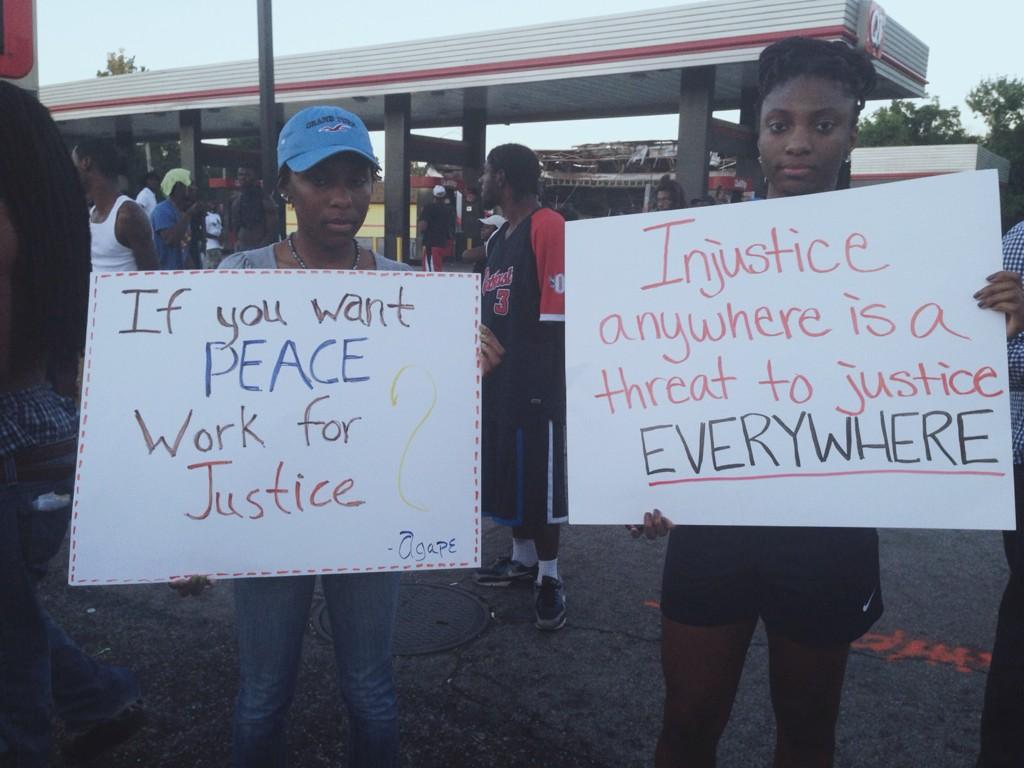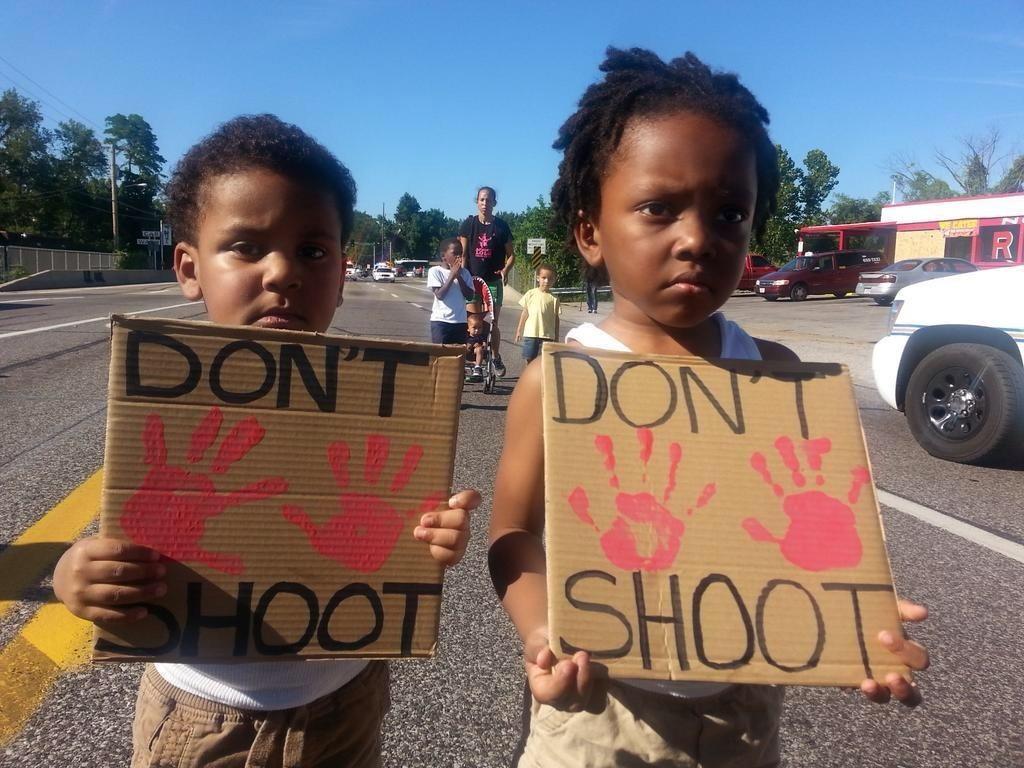Recognizing Complexity is Not Enough: Further Reflections on Ferguson
A sneak peak at my Rector's article for the Eagle: the Newsletter of St. John's Episcopal Church, Lafayette, Indiana
As I
write this, a certain degree of calm has come to the streets of Ferguson,
Missouri. The Governor has told the
National Guard troops that had taken up positions to withdraw, and the State
Police Captain in charge of the police response said this morning that things
were much, much more peaceful. Attorney
General Eric Holder was in Ferguson meeting with the family of Michael Brown,
the young man whose death sparked outrage in the community, and many
others.
This
week, I heard a report from NPR on the situation in Ferguson. The reporter was interviewing people in the
street. A man, who identified himself as
Bubba, told NPR’s Frank Morris:
You know what happens when you back a dog in the corner. He's going to act out, and he's going to bite you aggressively. You can't treat people like animals. Treat people how you want to be treated. That's the golden rule, I thought. So if they don't want to honor the golden rule, well, then the result is going to be the actions that you see.[The entire report can be found HERE.]
This
situation has been on my mind a great deal lately. On Sunday, August 17th, I preached
about the circumstances of Michael Brown’s death and the necessity of a loving,
grace-filled response on the part of the Church and of individual
Christians. The Gospel for that Sunday
was from Matthew. In the story, Jesus
and the disciples travel to the area near the towns of Tyre and Sidon, an area
north of the Galilee on the Mediterranean coast. The circumstances are complicated, but it is
important to know that for them, this is enemy territory. While there, Jesus is approached by a
“Canaanite woman” who shouts after him “Have mercy on me, Lord, Son of David;
my daughter is tormented by a demon.”
Jesus, however, ignores her, and his disciples want Jesus to send her
away. Jesus finally remarks that he has
been sent only “to the lost sheep of the house of Israel.” But, the woman shows
a substantial amount of bravado, kneels before Jesus, and says, “Lord, help
me.” This is the critical moment in the
story. What will Jesus do (and, if he is
our example, how must we respond)?
If you
know the story, you know that Jesus, well, he calls her a dog: “It is not fair
to take the children’s food and throw it to the dogs.” It isn’t the response we expect. It isn’t the response we might hope for. It isn’t what we’ve come to expect from
Jesus. As I said in my sermon that
Sunday, it’s a complicated story. There
are lots of hard questions that need to be answered: theological, cultural,
text-critical, linguistic, historical, etc.
The troubling questions have to do with Jesus’ response. Why does Jesus seem so disinterested in this
woman and her daughter? Why do their needs seem so unimportant to him? Why does he seem so callous? Maybe Jesus is playing along with her,
teasing her. Some folks have suggested
that the Greek word for “dog” here is a term of endearment—she’s a “little
puppy”. But this all seems wrong. What’s going on here?
The
woman is undaunted by Jesus’ response.
After all, her child’s life is at stake here. “Yes, Lord,” she says, “yet even the dogs eat
the crumbs that fall from their master’s table.”
I
couldn’t help but think of the Canaanite woman when I heard the interview with
Bubba. He’s been treated like a dog, and
so, like the Canaanite woman in our Gospel story, he co-opts the language and
owns it. “You want to treat me like a
dog? Then why are you surprised when I
bite?”
 In the
story of the Canaanite woman, Jesus finally heals the woman’s daughter because
of her faith. Well, that’s too
simple. He heals the woman’s daughter
because she pushed back, because she would not let him off the hook. He heals her daughter because she demanded
that she be treated as a human being and as a person worthy of respect and
love. She demanded that God’s kingdom be
expanded to include her daughter and her.
In the
story of the Canaanite woman, Jesus finally heals the woman’s daughter because
of her faith. Well, that’s too
simple. He heals the woman’s daughter
because she pushed back, because she would not let him off the hook. He heals her daughter because she demanded
that she be treated as a human being and as a person worthy of respect and
love. She demanded that God’s kingdom be
expanded to include her daughter and her.
Many
African-Americans in Ferguson and others besides have shown their faith. They have pushed back; they have not let the
rest of us off the hook. They have
demanded that Michael Brown receive justice, that African-Americans be treated
as human beings worthy of respect and love.
In the language of faith, they have demanded that God’s Kingdom be
expanded to include them.
In my sermon,
I went on to say:
I want to stand here in church this morning and I want to be a good Episcopalian. I want to be a good pastor. I want to be reasonable and measured. After all, outrage, really isn’t our thing. I want to say to you, “it’s complicated.” Because it is. The death of Mike Brown is complicated. The police response in Ferguson is complicated. The history of race and racism in this country is complicated.
But the simple fact is that saying “it’s complicated”, especially if those of us who are white simply leave it at that, is a noxious, sinful form of white privilege.
Recognizing
complexity is not enough. We have to
respond. As people of faith, we must be
people of prayer and action. We must
pray for calm and peace, but we must also demand justice (justice, not witch
hunts, but real, honest-to-goodness justice).
We must seek reconciliation.
As the
rector of St. John’s, I call on each of you to pray for peace and calm in
Ferguson, in Lafayette, in West Lafayette, and in the streets of every
city. I call on you to demand justice—in
particular, justice for Michael Brown, Trayvon Martin, Eric Garner, Renisha
McBride, Amadou Diallo, and more. I call
on you to remember the difficult work of living into God’s Kingdom: a kingdom
where we respect the dignity of every human being, and seek to serve Christ in
every person. For some of us, this means
owning up to our racial prejudice and our privilege in a society filled with
racial injustice. For some of us, it
will mean educating ourselves about the history of racism in this country and especially
of the way that history has been experienced by people of color. For every one of us, it will mean asking God
to fill us with grace and love.
In love
and service,
Bradley+

